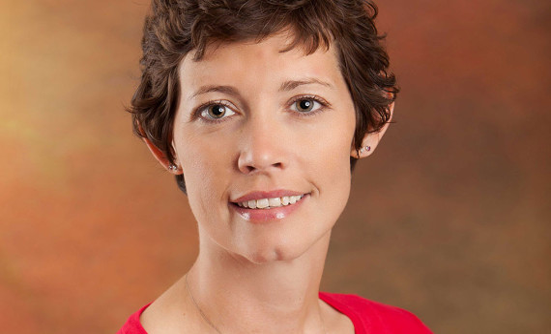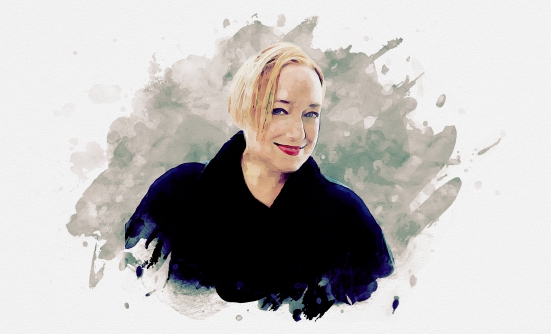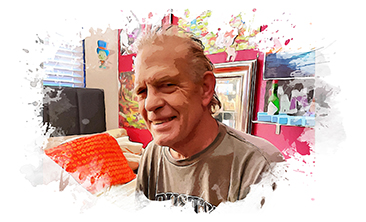CONQUER: Thank you for speaking with us. Can you tell me how undergoing treatment for breast cancer affected your interactions with friends and family?
Heather: My girlfriends, my best friends, still asked me to do things. Even though they knew that I probably couldn’t go out, because I was tired or something, they still asked me to take part. They would still ask, “Hey, do you want to go out for supper with us?” I could still have the interaction.
Those things really make a difference. They allowed me to still be myself.
I didn’t hide my breast cancer from my children by any means. When you have those eyes watching you as mom—I still very much wanted to be their mom. On my good days, I picked up my son at school, and I went to my daughter’s sports. On the days that my white count was low and I didn’t feel good, I might be sitting with the yellow mask on, and they knew that they couldn’t hug me that day.
CONQUER: That must have been difficult.
Heather: I still tried. What better time to live than when you think you might be dying? We still tried to do family activities. I took the kids to the State Fair for the first time.
I had an appointment down at M.D. Anderson, so we took the kids to Galveston to the beach and caught hermit crabs. We tried to do a lot of those things so that, looking back on it—in case I wouldn’t have made it and had such a good outcome—it wouldn’t have just been about the year that mom was dying. It would be about the year that we lived, too.
CONQUER: That’s really powerful—a great statement.
You brought up an interesting subject about maybe not feeling up to going out because your white blood cell count was low. You lost your hair. You lost your breasts. How did you deal with those physical changes? That can make a big difference for people.
Heather: Yes. Everybody handles it differently. I’m not a very high-maintenance person, as it is. Hair and makeup and clothing aren’t things that I normally am concerned about. However, you become very vulnerable.
I’m very low maintenance. I didn't think losing my hair was going to bother me one single bit, but the day that we ended up shaving my hair because it was falling out, I did have a hard time. When I had only had surgery and hadn’t had chemo yet, I didn’t feel like a cancer patient, but as soon as you lose your hair...
Until then, I still looked like Heather. I still looked like the same person. Even though the battle internally was ravaging me, I still looked like normal Heather. The minute you lose your hair, there’s no denying it to anybody. When you lose your hair, you are very much a cancer patient in the eyes of everybody.
Then, it was kind of nice to not have to worry about fixing my hair and coloring it!
CONQUER: That’s a great attitude.
Heather: Usually, I’m not a very self-conscious person. I don’t like my ears. When you don’t like your big ears and you’re bald, you quickly learn how to like your big ears!
I embraced it. My son was a first grader. His friends saw me going to through the physical changes. I wore a hat and a bandana and stuff for a long time. They would talk about it. It was a daily subject. I bought a book called Nowhere Hair. I took it to his class. I took all my wigs and a multicolored Madagascar wig. I read that book because I thought, “I don’t want these kids to be scared. Sometimes they don’t get to see a person go through this and come out on the other end OK. What a great opportunity.”
I read them the book, and then I tried on all of my wigs, including my Madagascar wig. I let them try on all the wigs. I made it very approachable for them and not scary. They have done so well with it.
I went for a visit to the class the other day. Here we are, 2 years out and they were all like, “Mrs. Rennick, you have a lot of hair now.”
CONQUER: That’s awesome.
Heather: They reminded me, “You wore the Madagascar wig.” I said, “I know.”
Just for them to see me go through it. How often do people see a bald head and they just want to stare because it’s natural curiosity? I took away that awkwardness. They wanted to rub my head. I let them rub my head for good luck and feel how fuzzy it was.
I tried to make it as normal as possible so hopefully the next time they encounter it, it’s not so scary for them.
CONQUER: That’s a really great idea.
There are other young mothers, obviously, who are going through this. What suggestions do you have for other young people who are facing a cancer diagnosis?
Heather: For those who have children, some of the advice that I do try to give is: call it what it is. Actually, I think that advice came from Andy Anderson. We called it what it was so that our kids understood. We never said, “Mama’s sick because of the medicine,” or, “Mom lost her hair because she’s sick.”
It was always, “Mom has breast cancer,” or, “Aunt Heather has breast cancer. Her hair fell out because of the chemotherapy.” We didn’t want the kids to be scared of getting sick or scared to take medicine. My dad and stepmom have 22 grandkids between them. That’s a lot of little kids who are watching us. We didn’t want any of them to refuse to take their cough medicine or their vitamins or something because Aunt Heather’s hair fell out.
At the same time, you don’t want to give them too much information. We gave them as much information as we felt they could handle. We didn’t keep secrets from them. We told them what we could as I went through it.
Not every day is going to be easy, but you’re still a mom. It’s motivation for them to get better, but it’s also some perspective for the kids because they see somebody get sick, and somebody go through it, and they see somebody get better.
The biggest advice I give is to focus on one day at a time. There are so many things—I'm the second of 6 kids, I’m a nurse, I’m a mom, I’m a wife. I plan. I like to be in control.
CONQUER: The control issue is complex.
Heather: If there’s anything I’ve learned it’s this: you lose all of that control. Then you spend so much time worrying about the things that are out of your control that you lose the joy of today. Don’t lose the joy of today by worrying about tomorrow. I could easily be killed in a car accident tonight, and if I’ve spent all day worrying about my surgery in 6 weeks, I’ve wasted that day. Keep it all in perspective. When tomorrow comes, we’ll deal with it then. Obviously there’s some planning you have to do, but as much as you can, try to remain true to yourself.
As mothers, our kids are usually our primary concern. We go, go, go, go, go our whole entire life, taking care of others. Very seldom do we stop and let people take care of us. I tell other patients, “This is the only time in your life, probably, that you have permission to slow down and let other people help you.” It’s hard. It’s hard to accept that help when you’ve always been the person doing all the nurturing. I ask them, “Say it was your sister that was going through this. If you wanted to drive her to an appointment, wouldn’t you want her to let you do that?”
Yes? Well then, if your sister wants to drive you to your appointment, accept that help. If your neighbor wants to cook you a meal, let her do that for you. Your friends and family and coworkers—there’s so much that they can’t do, so let them do the things that they can do.
CONQUER: That’s great advice.
Heather: It’s hard to let go of that control, but remember that most people like to feel useful. That’s how we are. Embrace that help and take advantage of it. They have good intentions.
CONQUER: What was the most important thing, for you, to keep your spirits up as you went through treatment? You had mentioned meeting with your friends. Was there anything else that you did? Any sort of alternative therapy or any sort of activities that you undertook that helped you keep your spirits up?
Heather: They say that we’re supposed to exercise, but between you and me, I’m not a fan of exercise. I did not exercise. We had some complementary things offered, like massages, reflexology, and Reiki therapy. I tried all of them to see if they helped. I like to read, so if I felt well enough I did some reading. I read a lot of books about keeping your spirits up! Mostly I’m a people person. Being around other people is actually what kept my spirits up. There are a couple of ladies in our community who go to church, and they would come over and pray with me.
It’s not one singular thing that helped me through it. It was a lot of different things. If I was up to having visitors, just to have somebody stop by briefly. It’s the little things—I loved it when my husband checked the mail and there was a card for me. You never realize the value of a card until you check the mail and somebody that you have known, even briefly, has taken the time to buy a card, find your address, put a stamp on the envelope, and mail it to you, to say, “Hey, I'm thinking of you.” That was so touching for me, because we’re in such a rushed world now. Everything is email or Facebook or text or something. To know that somebody made the effort to mail me a card was so exciting.
CONQUER: How are you doing now?
Heather: I’m doing great. Let’s see, January marked 2 years since the end of my chemo.
CONQUER: Congratulations!
Heather: I’m in the surveillance part, and things are going great.
CONQUER: That is so exciting.
What kinds of things do you do now, post diagnosis, post treatment? What do you do to make sure that your health is maintained and that you’re in the best possible condition you can be for yourself and your family?
Heather: My oncologist has the guidelines for my surveillance plan—for follow-up, maintenance, doctor appointments, when I have this kind of imaging or that kind of imaging, when I get my blood work. Then there are NCCN [National Comprehensive Cancer Network] guidelines about survivorship care. It’s about sleeping, and exercise, and stress reduction, and various other components.
Also, it’s about taking my multivitamins. I’m supposed to exercise 150 minutes a day and get a good night’s sleep. All those things that even non–breast cancer patients should be doing. That’s easier said than done, probably.
CONQUER: Yes, 150 minutes a day is tough.
Heather: It is; 150 minutes a week of exercise when you’re not an exercise fan is difficult. Then also, it’s making sure I take my flu shot and making sure I avoid stress. I love my job, so I’m lucky there. That’s not one of those bad stressors. I love going to work and doing what we do. Yes, I should be exercising and eating healthy foods, which is true for everybody, not just for cancer survivors.
I’m not allowed in a tanning bed anymore, so I gave that up after 8 years. I cried that day. It seems like such a small thing, but it’s things that you take for granted. You use a tanning bed so you have color and for the warmth. Suddenly, you’re not allowed to do that anymore. And then it’s about embracing the cold and your space heaters and sunscreen.
CONQUER: One last question. Has your experience with cancer made you a better practitioner—a better nurse and navigator?
Heather: Many times people think that a cancer diagnosis is such a horrible, horrible thing. I’m not saying that I’d want to go through it again or that I would wish it upon someone, but the cancer diagnosis has by far made my life better.
I said it has taken things from me, like my hair and my breasts, but I’ve gained so much more from it than it’s ever taken. Friendships formed that I might not have ever had. You see the good in people—the things that they want to do for your family to help you get through it and the support that they offer.
It’s even afforded me a job opportunity that I might not ever have pursued. Would we have an accredited breast program in Garden City this year? Maybe somebody else would have done it, but maybe not, so to be able to pay it forward in that way is meaningful.
My community did a softball fundraiser for me the year I was diagnosed. As an opportunity to pay it back, we’ve continued the fundraiser for other cancer patients in our community. To have a community come together and to continue doing so much good, to be part of that is awesome.
I think I did appreciate life before because of other circumstances that I’d been through, but my cancer really makes me value the day. Even though you might have a family history and you might be worried about cancer down the road, it’s not urgent. I really wasn’t thinking, at the age of 33, that it was going to happen to me.
How many times do you hear people complain, “Oh, another Christmas program, another sports event I have to sit through, another parent-teacher conference”? Man, let me have one more. That’s how I feel about so many things. I try to be more appreciative of every day. Then there’s survivor’s guilt. The ones of us that survive and are doing well know there were a lot of people before us who didn’t get this far. I try to make sure that I keep that in mind. On those days that it seems like I might be taking life for granted, I remember that there were a lot of other people that paid the ultimate price.
How does it make me a better nurse and a navigator? I’ve walked the walk, so I think it helps me talk the talk. I by no means know everything about it. Personally, I know I love it when I meet somebody that’s gone through it and is surviving and thriving.
I think that when our patients are diagnosed, they don’t feel like there’s a light at the end of the tunnel. If it comes up and they realize that I am a survivor, too, I say, “Just 2 years ago I was sitting in that exact same seat as you.” They tell me every time, “I'm so happy to see you alive, to know that it is possible.” I understand. Not that you have to be a cancer patient to be a good navigator, but it gives you a better insight, a better understanding.
CONQUER: Heather, thank you so much for your time.
Heather: You’re welcome. This was great. I’m glad you were willing to listen.















